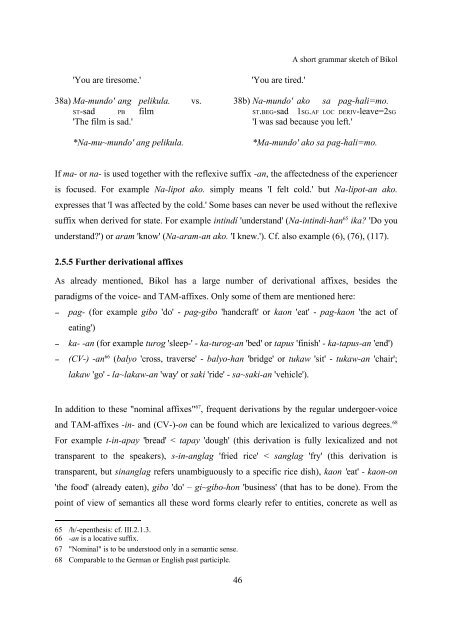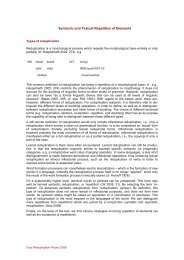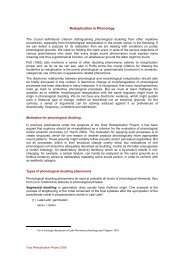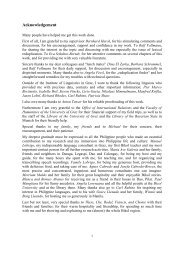- Page 1 and 2: CHAPTER I: INTRODUCTION INTRODUCTIO
- Page 3 and 4: INTRODUCTION Such a view is long si
- Page 5 and 6: Definition of Reduplication has all
- Page 7 and 8: Criteria for the classification of
- Page 9 and 10: Criteria for the classification of
- Page 11 and 12: Criteria for the classification of
- Page 13 and 14: Brief history of the research on re
- Page 15 and 16: Brief history of the research on re
- Page 17 and 18: Brief history of the research on re
- Page 19 and 20: Brief history of the research on re
- Page 21 and 22: Brief history of the research on re
- Page 23 and 24: CHAPTER III: BIKOL 1 The language a
- Page 25 and 26: The language and the data Rawit-Daw
- Page 27 and 28: front central back high i u (mid) (
- Page 29 and 30: A short grammar sketch of Bikol 'fl
- Page 31 and 32: 2.3 Spelling A short grammar sketch
- Page 33 and 34: A short grammar sketch of Bikol (fu
- Page 35 and 36: A short grammar sketch of Bikol 2c)
- Page 37 and 38: A short grammar sketch of Bikol 11)
- Page 39 and 40: A short grammar sketch of Bikol be
- Page 41 and 42: A short grammar sketch of Bikol I-
- Page 43 and 44: 2.5.3 Number A short grammar sketch
- Page 45: 32) gútom 'hunger' - gutóm 'hungr
- Page 49 and 50: function) and in the argument (in r
- Page 51 and 52: (52) dalágan 'speed / run' (52a) a
- Page 53 and 54: The reduplication system of Bikol C
- Page 55 and 56: A survey of the reduplication types
- Page 57 and 58: A survey of the reduplication types
- Page 59 and 60: Lexical Reduplication syllables, i.
- Page 61 and 62: Lexical Reduplication those which d
- Page 63 and 64: Lexical Reduplication "diseases", "
- Page 65 and 66: Lexical Reduplication skin disease)
- Page 67 and 68: Lexical Reduplication ‘hanging th
- Page 69 and 70: Lexical Reduplication constituents,
- Page 71 and 72: Lexical Reduplication Even if the o
- Page 73 and 74: Lexical Reduplication especially be
- Page 75 and 76: Lexical Reduplication quantity, i.e
- Page 77 and 78: Lexical Reduplication Kouwenberg an
- Page 79 and 80: Lexical Reduplication iconic. And i
- Page 81 and 82: 53) Nag-ngi~ngirit! BEG.AV-IMPFV~la
- Page 83 and 84: C1(C2)V1(V2)X/ /C1V1C1(C2)V1(V2)X/
- Page 85 and 86: Productive reduplication identity o
- Page 87 and 88: Productive reduplication and base a
- Page 89 and 90: Productive reduplication EXCURSUS I
- Page 91 and 92: Productive reduplication even if th
- Page 93 and 94: Productive reduplication 61)... kit
- Page 95 and 96: Productive reduplication (e.g. *sin
- Page 97 and 98:
76) Pig-para-bicol-an=ko. BEG.UG-RE
- Page 99 and 100:
Productive reduplication 'sorrow, c
- Page 101 and 102:
Productive reduplication reduplicat
- Page 103 and 104:
Productive reduplication directions
- Page 105 and 106:
'x' 'exact x' Figure 10. Rule for n
- Page 107 and 108:
Productive reduplication structure
- Page 109 and 110:
Productive reduplication example of
- Page 111 and 112:
Productive reduplication prefix is
- Page 113 and 114:
Productive reduplication initial no
- Page 115 and 116:
Productive reduplication “The ter
- Page 117 and 118:
maC1(C2)V1(V2)X/ /maC1V1C1(C2)V1(V2
- Page 119 and 120:
Productive reduplication parallels
- Page 121 and 122:
Productive reduplication secondly,
- Page 123 and 124:
Productive reduplication is express
- Page 125 and 126:
Productive reduplication performed
- Page 127 and 128:
Productive reduplication 99) Siram
- Page 129 and 130:
4.2.2.1 Different accent patterns f
- Page 131 and 132:
Productive reduplication criterion
- Page 133 and 134:
1. exact full reduplication with C1
- Page 135 and 136:
Productive reduplication express di
- Page 137 and 138:
Productive reduplication The semina
- Page 139 and 140:
Productive reduplication C1V1.C2V2(
- Page 141 and 142:
Productive reduplication quantity
- Page 143 and 144:
Productive reduplication were caugh
- Page 145 and 146:
Productive reduplication luto~luto
- Page 147 and 148:
Productive reduplication environmen
- Page 149 and 150:
Productive reduplication on one cog
- Page 151 and 152:
Productive reduplication and conseq
- Page 153 and 154:
Productive reduplication monosemes
- Page 155 and 156:
Productive reduplication of polysem
- Page 157 and 158:
Saka sa pisngi=mo; and LOC cheek=2S
- Page 159 and 160:
Summarizing comments on reduplicati
- Page 161 and 162:
many cases, as was argued in 5.5.1.
- Page 163 and 164:
Reference to the central questions
- Page 165 and 166:
REFERENCES References Abraham, Wern
- Page 167 and 168:
References Bossong, Georg. 2001. "A
- Page 169 and 170:
References Dressler, Wolfgang U. an
- Page 171 and 172:
References Haiman, John. 1980. "The
- Page 173 and 174:
References Hurch, Bernhard. 2003. O
- Page 175 and 176:
References Kröll, Heinz. 1991. "Be
- Page 177 and 178:
References McFarland, Curtis D. 197
- Page 179 and 180:
References Raimy, Eric. 1999. Repre
- Page 181 and 182:
References Starosta, Stanley. 1995.
- Page 183 and 184:
APPENDIX A: MAPS Map 1: The Philipp
- Page 185 and 186:
Appendix B: Glossing abbreviations
- Page 187 and 188:
paul's stories Three "cock-and-bull
- Page 189 and 190:
Poems (rawit-dawit) Tolong Bangging
- Page 191 and 192:
guygóy [MDL] hadhád [MDL] ha'há'
- Page 193 and 194:
kilkíl/kíkil to extort, to blackm
- Page 195 and 196:
luló maghing-, hing- -on: to shed
- Page 197 and 198:
ngawtngáw t [MDL] ngingí' [MDL] n
- Page 199 and 200:
pumpóm / punpón to collect with t
- Page 201 and 202:
sapsáp to lop off, to cut off the
- Page 203 and 204:
tabtáb (-on) Appendix D: List of B
- Page 205 and 206:
tungtóng [MDL] to tap s.th. (so as
- Page 207 and 208:
Appendix D: List of Bikol reduplica
- Page 209 and 210:
ula~lakáw [MDL] Appendix D: List o
- Page 211 and 212:
lagayláy 1. enchanted, bewitched,.
- Page 213 and 214:
agagrák the ra-ta-tat-tat sound of
- Page 215 and 216:
Appendix D: List of Bikol reduplica
- Page 217 and 218:
taluytóy referring to the flow of
- Page 219 and 220:
Lexical full reduplication lexeme M
- Page 221 and 222:
Appendix D: List of Bikol reduplica
- Page 223 and 224:
irót-irót to incite a fighting co
- Page 225 and 226:
Appendix D: List of Bikol reduplica
- Page 227 and 228:
lúba-lúba [MDL] (arc-) mask, to w
- Page 229 and 230:
Appendix D: List of Bikol reduplica
- Page 231 and 232:
utós-rutós [MDL] sa'án-sa'án (m
- Page 233 and 234:
ta'ód-ta'ód shortly, in a little
- Page 235 and 236:
wangís-wangís [MDL] wasáng-wasá
- Page 237 and 238:
2. with internal consonant mutation
- Page 239 and 240:
palángpagáng [MDL] palás-pagás
- Page 241 and 242:
dóble double, twice as much dúsa
- Page 243 and 244:
ibók noise; clamor, din, hubbub ri
- Page 245 and 246:
Full (and Curu-) reduplication simp
- Page 247 and 248:
alós [MDL] to take revenge on, to
- Page 249 and 250:
úhay [MDL] life buháy-búhay pers
- Page 251 and 252:
dúyan cradle, hammock duyán-dúya
- Page 253 and 254:
iwós to avoid Nag-iwós siya sa pe
- Page 255 and 256:
kinó' mouse, rat, rodent kinó'-k
- Page 257 and 258:
(ha-) langkáw tall haró-halangká
- Page 259 and 260:
lubót 1. the backside, behind, but
- Page 261 and 262:
pakang hit (corruption) pakángpak
- Page 263 and 264:
ungáw crazy, insane, mad, a fool;
- Page 265 and 266:
singsing ring siro-singsing (suro-.
- Page 267 and 268:
tará hello, what's up? tará-tará
- Page 269:
úlay (maki-, ma- -ka, ka- -on) to





